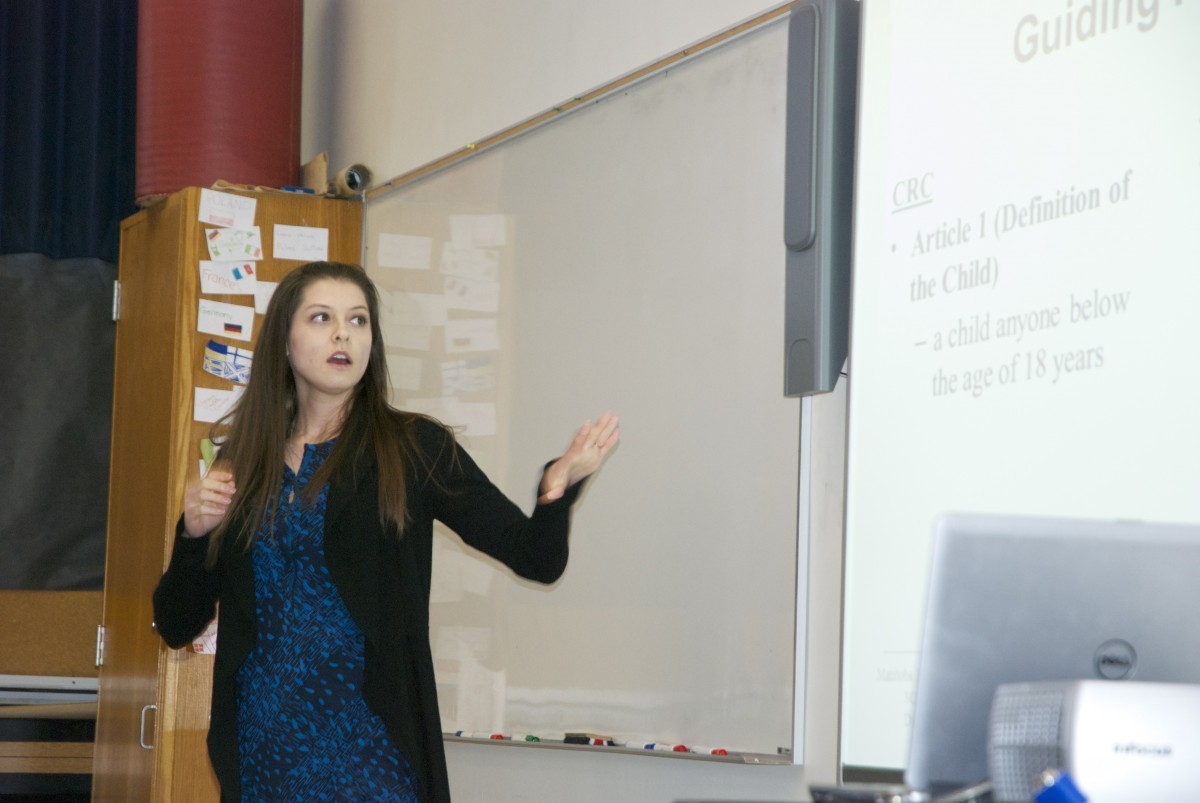
Alannah Harapiak discusses how to ensure children in care have a positive experience in school during UMCAST 2016.
UMCAST 2016 helps students with research, presentation skills
Nine teacher candidates presented work on varied educational topics, from children in care to universal design
Teachers need to be more sensitive to the needs of children in care, and those students need to have a voice, one of the presenters at this year’s UMCAST told peers and professors.
“Children have the right to have their voices heard in anything that affects them,” said Alannah Harapiak, a second-year teacher candidate in the Middle Years stream, during the teacher candidate conference that was held during the Educational Conference (EdCon) on Feb. 16. But some research and policy documents have shown that there are a “lack of rights for children in care,” she noted.
“If we take the time to look at children’s rights and specifically their voice, we know that there are a number of benefits.”
A total of nine Bachelor of Education students participated in this year’s UMCAST, which was built on the tradition of WestCAST. The WestCAST (Western Canadian Association for Student Teaching) conference is held annually in one of the four western provinces. (The conference was not held this year so the Faculty of Education sponsored its own internal conference).
During the conference, the teacher candidates shared their research on a variety of subjects with their peers, professors and guests.
Topics included exploring the misuse of levelled texts in early years, creating inclusive classrooms through integrating Indigenous worldviews, challenges educators face working with children in care, fostering student engagement through choice in visual arts, strategies using universal design in mathematics and exploring teacher candidates’ experiences in Northern Practicums.
Harapiak’s presentation, “Is our educational system failing children in care?” used the UN Convention on the Rights of the Child to discuss children’s rights in schools, including those from foster homes.
Many teachers could use training in this convention, she said.
“When educators give students a voice in their classroom, there are positive outcomes…they do better academically, socially and emotionally.”
Harapiak recommended that when out in the field, teachers remain sensitive to the special issues and concerns that occur with children in care, including developing mentorship programs for improved self-esteem, good communication with foster families, creating a classroom community and promoting a positive system with the students to “help them be successful.”
Literacy myth busters
Teachers can often be too reliant on levelled “readers” for early years pupils, found another presentation. These are reading materials typically found in schools that progress from easy text to more difficult or complex.
Children who receive reading assignments with books that are indicated “for their level” can often be frustrated and experience a lack of interest in the books and reading, said Andrea Boyd, Diandra Etkin and Alexis Prychitko during their presentation. All three Early Years teacher candidates are in their final year of study.
Their presentation was entitled “Literacy myth busters: exploring the misuse and overuse of levelled texts in early years.”
The group said interest and familiarity are the most important factors in how difficult or easy an item is to read.
They recommended teachers follow several other strategies for encouraging learning to read for young children, including letting them choose their own books, because their pleasure will lead to increased reading and practice, which in turn, results in proficiency.
“Not tell them which books to read but help them to choose the books,” said Boyd. But, she added, teachers are still the guide. “You need a teacher’s support to help them choose those books.”
Integrating Indigenous worldviews
Yet another presentation encouraged teacher candidates to incorporate Indigenous art in the classroom to create inclusive classrooms, in subjects such as visual arts and science, as long as they consult with experts in those fields and use the materials with respect.
Those who took part in UMCAST 2016 indicated that the experience gave them confidence in both their research abilities and their classroom presentation skills.






